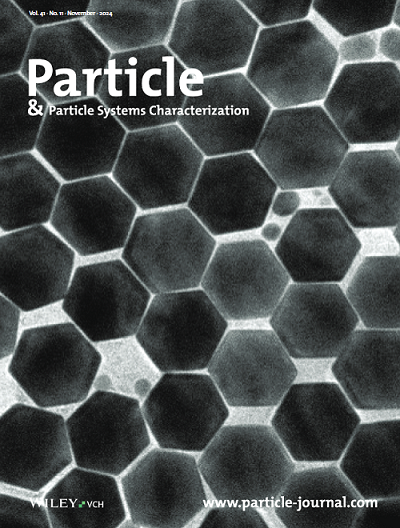优化 PLGA 微颗粒的配方条件以提高吲哚美辛的包囊率
IF 3
4区 材料科学
Q3 CHEMISTRY, PHYSICAL
引用次数: 0
摘要
吲哚美辛(IND)是一种用于治疗骨关节炎和关节炎的非甾体抗炎药物,需要高剂量才能达到治疗血浆水平,从而导致严重的全身副作用。本研究旨在优化用于关节内给药 IND 的聚(乳酸-共聚-乙醇酸)(PLGA)微颗粒(MPs)。MPs 采用溶剂蒸发法制备,并经冷冻干燥以提高稳定性。最初用吐温 80 配制的样品呈橡胶状,载药量较低(1%);用明胶替代吐温 80 后,可制成稳定的粉末状可注射 MPs(颗粒大小:7 微米),但由于 IND 的多态性转变,DL(3%)和 EE(30%)仍未达到最佳状态。差示扫描量热法和傅立叶变换红外光谱法证明了 IND 在聚乳酸乙烯-丙烯酸酯(PLGA)中的分子分散性。在制剂过程中将水相的 pH 值调至 3,即低于 IND 的 pKa 值,可显著提高 EE 值(90%),这是因为药物在外部水相中的溶解度降低了。体外释放研究显示,IND 的释放时间延长了数天,证实了药物封装的有效性。这项研究为优化 IND 在 PLGA MPs 中的成功封装提供了一个基础框架,有可能推动这类给药系统在未来的临床应用。本文章由计算机程序翻译,如有差异,请以英文原文为准。
Optimizing Formulation Conditions of PLGA Microparticles to Enhance Indomethacin Encapsulation
Drug delivery systems can avoid the drawbacks of Indomethacin (IND), a non‐steroidal anti‐inflammatory drug used to treat osteoarthritis and arthritis, which requires high doses to reach therapeutic plasma levels leading to significant systemic side effects. This study aims to optimize poly(lactic‐co‐glycolic acid) (PLGA) microparticles (MPs) for intra‐articular IND administration. MPs are prepared by solvent evaporation and freeze‐dried for stability. Initial formulations with Tween 80 yield rubbery samples with low drug loading (1%); replacement of Tween 80 with Gelatin produces a stable powder with syringable MPs (particles size: 7 µm), although, DL (3%) and EE (30%) remain suboptimal, due to IND polymorphic transformation. Differential Scanning Calorimetry and Fourier‐Transform Infrared spectroscopy demonstrate a molecular dispersion of IND in PLGA. Adjusting the aqueous phase to pH 3 in the formulation process, i.e below IND pKa, significantly enhances EE (90%) due to the reduction of drug solubility in the external aqueous phase. In vitro release study shows prolonged IND release over several days, confirming an effective drug encapsulation. This study provides a foundational framework toward the optimization of the successful encapsulation of IND in PLGA MPs, potentially advancing future clinical applications of such drug delivery systems.
求助全文
通过发布文献求助,成功后即可免费获取论文全文。
去求助
来源期刊

Particle & Particle Systems Characterization
工程技术-材料科学:表征与测试
CiteScore
5.50
自引率
0.00%
发文量
114
审稿时长
3.0 months
期刊介绍:
Particle & Particle Systems Characterization is an international, peer-reviewed, interdisciplinary journal focusing on all aspects of particle research. The journal joined the Advanced Materials family of journals in 2013. Particle has an impact factor of 4.194 (2018 Journal Impact Factor, Journal Citation Reports (Clarivate Analytics, 2019)).
Topics covered include the synthesis, characterization, and application of particles in a variety of systems and devices.
Particle covers nanotubes, fullerenes, micelles and alloy clusters, organic and inorganic materials, polymers, quantum dots, 2D materials, proteins, and other molecular biological systems.
Particle Systems include those in biomedicine, catalysis, energy-storage materials, environmental science, micro/nano-electromechanical systems, micro/nano-fluidics, molecular electronics, photonics, sensing, and others.
Characterization methods include microscopy, spectroscopy, electrochemical, diffraction, magnetic, and scattering techniques.
 求助内容:
求助内容: 应助结果提醒方式:
应助结果提醒方式:


